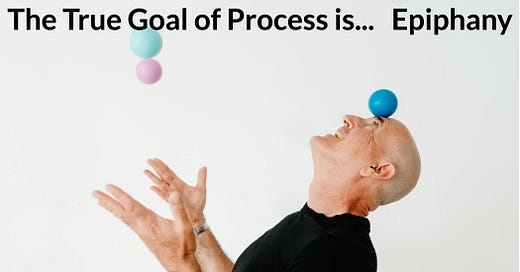The Mindset Mastery Memo is for ambitious professionals who want to lead with clarity, calm, and confidence. Each edition offers practical tools, mindset shifts, and real-world examples to help you navigate pressure, build stronger teams, and break free from patterns that no longer serve you—so you can lead with intention, not reaction.
For years, I've referenced and coached teams using Steve Blank's seminal book, The Four Steps to the Epiphany. It’s a cornerstone of structured entrepreneurship, a masterclass in tactical, evidence-based execution. We focus on the "four steps"—the customer discovery, the validation, the metrics, the pivots.
But we often glide past the most important word in the title: Epiphany.
Why would a book filled with meticulous process, stage-gates, and canvases encourage us to reach for something so intangible? This paradox holds a critical lesson for every modern organization.
Physics Can’t Produce Epiphanies
Blank’s methodology is rigorous. It feels like a science: You follow the steps, you gather the data, you test the hypotheses.
It creates the illusion of a predictable system. If you do A, B, and C, you should get D.
Like smacking the cue ball into a rack of pool balls, if you knew all the variables—the vectors, forces, and angles—physics would allow you to predict where every ball will end up.
But business isn't a game of pool. Blank's genius was realizing that even with the most rigorous process, the goal isn't a predictable outcome. The goal is an emergent one: an epiphany.
The word comes from the Greek epiphaneia, meaning "a shining upon." It describes a moment when a profound truth suddenly appears to you, revealing a new way of seeing the world.
It’s not a deliverable. It’s not a spreadsheet, a PDF, or a canvas. It’s a transcendent shift in understanding that cannot be reverse-engineered from a process chart.
And this is the crucial point for all of us, whether we're in a startup or a global corporation.
Process Isn’t Enough
Too many leaders and organizations have become obsessed with process, but have forgotten the purpose.
They run the plays, fill out the templates, and hold the "innovation workshops," but don’t know how to create the conditions under which epiphanies can emerge.
We are engineering processes, not insights.
In an era dominated by AI, this distinction is more urgent than ever. We risk outsourcing our thinking to models that are exceptionally good at collating existing knowledge.
If our only goal is to respond to the future by analyzing the past, AI will always do it faster.
But AI, as it currently exists, cannot have the epiphany.
The ability to see and create a better future is our unique human advantage.
The future won't be won by those who simply follow the steps better. It will be won by those who can cultivate the conditions for these profound, unpredictable moments of insight.
How to Set the Stage for Epiphanies
An epiphany is not a predictable outcome, but an emergent breakthrough that arises from a prepared mind in a prepared organization. To create the conditions for these insights, you must build specific, foundational capabilities.
Find the Calm to See Clearly
Epiphanies avoid minds that are hijacked by stress. The first step is therefore mastering composure under stress.
By developing the ability to reset your mind and body when you get triggered, you keep your prefrontal cortex online when others are panicking. This mental quiet is the non-negotiable headspace where new ideas can actually form.
Reframe the Problem to Reveal New Paths.
Epiphanies often come from seeing the same landscape through a new lens.
Once you can hold composure and neutrality in the face of alarming developments, you can begin to apply cognitive flexibility: the skill of holding competing ideas and swapping mental models on demand.
Instead of seeking the one right answer, you learn to ask "What else could be true?", nourishing ambiguity and creating fresh perspectives that are the raw material for a breakthrough.
Map the System to Uncover Root Causes.
Once you’re willing to let go of default thinking and embrace new ways of looking, you’re ready to put on the most powerful lens of all: the holistic one.
The most profound organizational epiphanies happen when you stop fixing symptoms and see the whole. When you cultivate systems thinking to map the feedback loops and hidden forces, you can “beautiful mind” your way to stunning new insights and solutions.
The ultimate competitive advantage isn't a more refined process or a faster algorithm. It is the ability to create and maintain an environment where predictable effort gives rise to something transcendent and unexpected.
I'm reserving time on my calendar for Capability Audits for leaders who are tasked with preparing their organizations to survive and thrive in the next five years. You can schedule it at https://link.howiejacobson.com/widget/bookings/hj60disc.
#Innovation #Leadership #BusinessStrategy #CorporateCulture #2030-skills





Howie, I really enjoyed this piece. You emphasize the role of je ne sais quoi for innovation, in what my collaborator Laura Kornish and others refer to as the fuzzy front end. I deeply appreciate your recognition of the role of cognitive flexibility—a topic on which I am currently doing research—and I love how you used “beautiful mind” as a verb! Putting mysticism to work is as important for business as it is for understanding economics (which of course I do in my own Substack). Cheers.